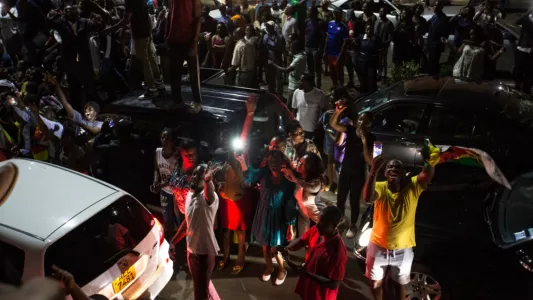Davina Jogi's (@deejogi) series, The People have Spoken documents the events leading up to the resignation of Zimbabwe's President Robert Mugabe, after his 37 years in office. Mugabe was a face impossible to forget- and during his rule, impossible to escape. In Jogi's earlier work, The Portrait, she explores the imposing presence of Mugabe across Zimbabwe - his portrait a mandatory display in the practices of business owners.
The Zimbabwe Defence Forces (ZDF) seized control of Harare on November 15th, 2017, placing president Mugabe under house arrest. This occurred just one week after the vice president, Emerson Mnangagwa had been fired. Emboldened by the ZDF's presence, the people of Zimbabwe took to the streets in support of the military and demanded the resignation of the President.

This demonstration was significant in ways beyond the intention to prompt presidential change, as this was the first time in nearly forty years that Zimbabweans could protest freely against Mugabe without fear of reprisal. The series name, The People have Spoken is a testament to this event of nationwide catharsis, emphasising the will of the people. The words were first spoken by Mnangagwa upon his return from exile, after the military takeover had ended, and represented hope for the people that the political and economic injustices might come to an end under his leadership. The work builds on this, encapsulating the unbridled energy of a nation reclaiming its voice whilst celebrating the end of a chapter that had been marked by quiet compliance, coercion and suppression. Jogi comments that despite this reason for hope 'the heavy military presence served as a reminder of Mnangagwa's unorthodox ascension to power'.
© Davina Jogi
Through her lens, Jogi captures the energies and various movements of this historic event, preserving the intensity of a nation on the cusp of change, showcasing voices in pursuit of a new era. She captures the exuberance of protest and dance, taking expressive images that allow us to resonate with the passion and catharsis of the events. Complimentary to this, there are images more gently paced, that offer us time to pause and contemplate on the events that have occurred, and of what might follow. Jogi's series strikes a balance between reactive expression and reflective stillness. From the simple gesture of an outstretched hand waving the Zimbabwean flag from a vehicle, to the silhouettes and handmade signs, her images reflect a spectrum of experiences. One of the most assertive photographs in the series depicts a soldier, arms folded, standing over the sign The People have Spoken. This range of perspectives personifies the spirit of Zimbabwean resistance and captures the complexities of the nation's political landscape during this pivotal time.
© Davina Jogi
Davina Jogi is a Zimbabwean documentary photographer, writer, and researcher whose work explores themes of social injustice, identity, belonging, and place. She is currently investigating the complexities of hybrid cultural identity in her introspective series The Landscape Does Not Sit Willingly. Additionally, she is the co-founder and director of the Zimbabwe Association of Female Photographers (@zafp_org), an initiative aimed at promoting visual literacy in Zimbabwe, using documentary photography to challenge and offer an alternative to the male-dominated media narratives.












